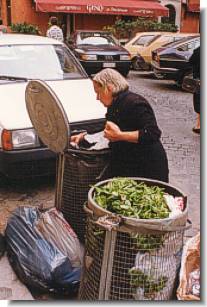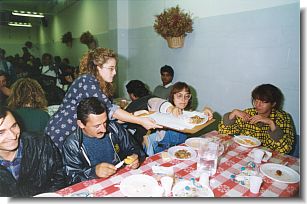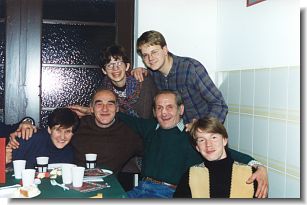|
 The Soup-kitchens The Soup-kitchens
Food is one of the most serious poverty problems, and it is a paradox, that interests the European cities too. More and more we see people searching into rubbish bins looking for food.
Providing food for the hungry is a very old value, which has spread to other cultures, because it has a direct link to the value of life. The scandal of hunger is a decisive fact for the Christian consciousness as from the Gospel parable of the rich man, who banquets lavishly while the poor Lazarus stays at the door. The same value of providing food is rooted in the Jewish and in the Islamic culture and it is connected to hospitality.
But the hungry people represent a question to the consciousness of everybody, believers and humanists: we cannot put off till tomorrow who are in vital need, and thus cannot wait. This is the heart of the culture of the solidarity.
The first soup-kitchen arises from this consciousness. Afterwards soup-kitchens, canteens for the poor, have been opened in Antwerpen (Belgium) and in W�rzburg (Germany). Since 1990 also in Moscow the canteen, thanks to the initiative of Alexander Ogorodnikov and to the help by the Community of Sant'Egidio, has welcomed poor old people and the homeless.
Also in the jails of Mozambique and of other African countries as well as in the psychiatric hospital of Tirana in Albania the members of the Community help inmate people with food and warm meals.

The soup-kitchen in Via Dandolo - Rome
In the canteens guests are served with a free warm and abundant meal in a friendly and hospitable climate. Who comes to eat would like to find not only satisfaction to his or her hunger, but also what often is denied: sympathy, respect and human warmth.
The attention to dignity and to personality of everybody is expressed in the care of the environment, in the courteous attitude of the volunteers serving to the tables. A particular attention is paid to the meal: the eating habits of the guests are considered, with respect to their religious tradition. For example, in consideration of the presence of Muslims, pork or wine are never served.
The service is done entirely by volunteers, who freely offer their free time in order to help this people and also in other initiatives.
In Rome, since its beginning in 1988, the soup-kitchen has given hospitality to more than 100.000 people and has served 2.200.000 meals. In Antwerpen we serve ca. 150 meals to young homeless people and to people in difficult situation. In W�rzburg ca. 50 people (amongst them many are old and alone) find company and refreshment in the soup-kitchen.

The soup-kitchen in Antwerpen - Belgium
|
![]()
